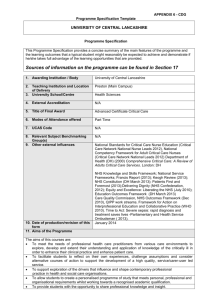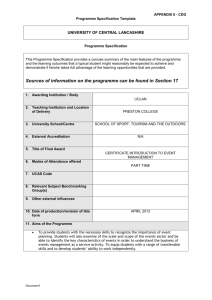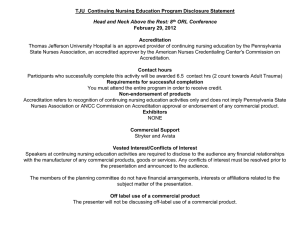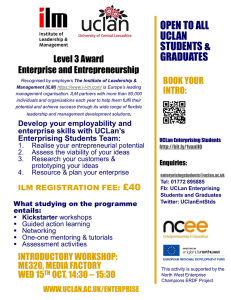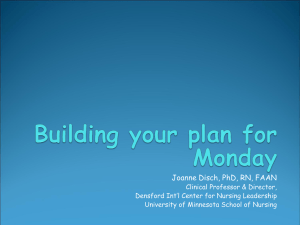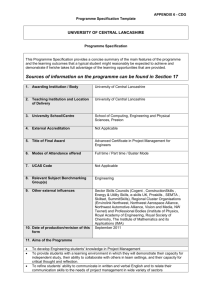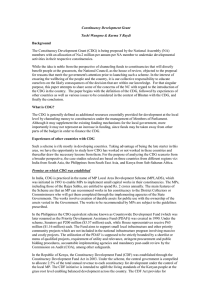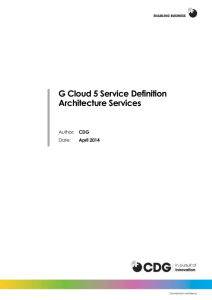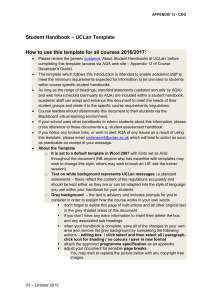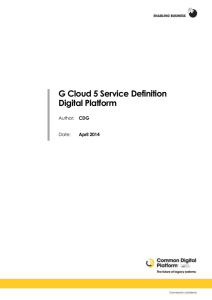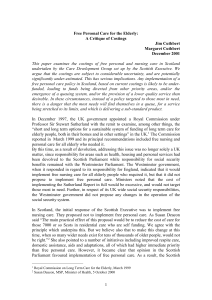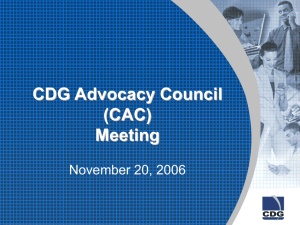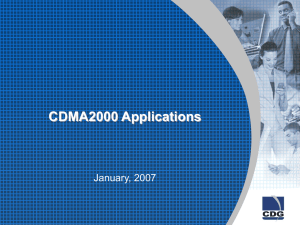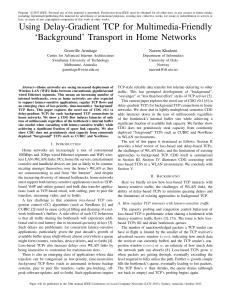Grad Cert Critical Care Nursing (June 12)
advertisement
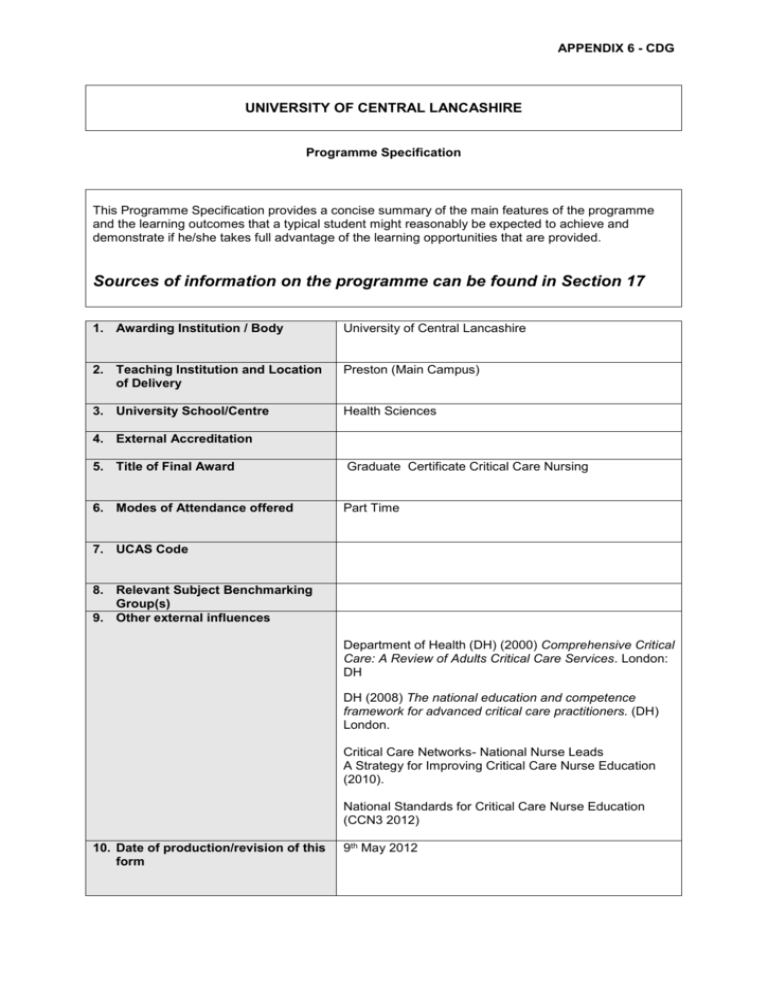
APPENDIX 6 - CDG UNIVERSITY OF CENTRAL LANCASHIRE Programme Specification This Programme Specification provides a concise summary of the main features of the programme and the learning outcomes that a typical student might reasonably be expected to achieve and demonstrate if he/she takes full advantage of the learning opportunities that are provided. Sources of information on the programme can be found in Section 17 1. Awarding Institution / Body University of Central Lancashire 2. Teaching Institution and Location of Delivery Preston (Main Campus) 3. University School/Centre Health Sciences 4. External Accreditation 5. Title of Final Award Graduate Certificate Critical Care Nursing 6. Modes of Attendance offered Part Time 7. UCAS Code 8. Relevant Subject Benchmarking Group(s) 9. Other external influences Department of Health (DH) (2000) Comprehensive Critical Care: A Review of Adults Critical Care Services. London: DH DH (2008) The national education and competence framework for advanced critical care practitioners. (DH) London. Critical Care Networks- National Nurse Leads A Strategy for Improving Critical Care Nurse Education (2010). National Standards for Critical Care Nurse Education (CCN3 2012) 10. Date of production/revision of this form 9th May 2012 APPENDIX 6 - CDG 11. Aims of the Programme The aims of this course is: To enable critical care nurses from clinical environments relevant to the outcome award to explore and extend their understanding and application of the knowledge that informs competent clinical practice. To facilitate critical care nurses to reflect on their own experiences, challenge assumptions and consider alternative courses of action to support the development of a high quality critical care service. To support exploration of the drivers that influence and shape contemporary professional practice in health and social care organisations 12. Learning Outcomes, Teaching, Learning and Assessment Methods A. Knowledge and Understanding A1. Identify, retrieve and review research findings making judgments about the appropriateness for their sphere of practice. A2. Identify, select, and assess appropriate information / data to inform clinical decision-making. A3. Take account of the legal and professional frameworks that govern practice, recognising the parameters of their role and provide care congruent with the professional codes of behaviour, organisational requirements and personal value systems. A4. Adopt a critical, questioning approach to practice and contribute to an environment that facilitates the development of practice.. Teaching and Learning Methods Each module will adopt a range of learning and teaching strategies that aim to meet the needs of students with diverse clinical and educational experiences. Key lectures to introduce themes and concepts Class room based discussion to enable student to reflect on their own practice and share ideas with others Student seminar – individual and group Group work activity e.g. problem solving exercises, case studies, Directed study in the form of workbooks, reflection on practice, guided reading Use virtual learning environment to provide supplemental reading/activity, module information and a student discussion board Assessment methods Essays, written examinations, presentations, clinical competencies B. Subject-specific skills B1 Discuss the altered physiological processes of specific diseases processes and explain how this manifests in clinical practice. B2. Utilise clinical assessment, monitoring and surveillance skills to obtained data that informs diagnosis, care planning and delivery and the evaluation of the effectiveness of clinical interventions. B3. Utilise specialist knowledge and skills to assess, plan, implement and evaluate individualised plans of care for patients through the trajectory of care in health and /or social care environments. B4. Discuss the roles that members of the multi- disciplinary team and service users/carers have in the overall provision of care acknowledging and recognising the contributions that individuals/professional groups offer to the delivery of effective high quality care. B5. Facilitate and support the involvement of service users/carers in the delivery of care and/or development of the service. Teaching and Learning Methods Each module will adopt a range of learning and teaching strategies that aim to meet the needs of students with diverse clinical and educational experiences. Key lectures to introduce themes and concepts Class room based discussion to enable student to reflect on their own practice and share ideas with others Group work activity e.g. problem solving exercises, case studies APPENDIX 6 - CDG Directed study in the form of workbooks, reflection on practice, guided reading Use of virtual learning virtual learning environment to provide supplemental reading/activity, module information and a student discussion board Assessment methods Essays, written examinations, presentations, clinical competencies C. Thinking Skills At the end of the course the student will be able to: C1. Explore challenges that arise from a patient /carer, organisational and/or professional perspectives and contribute to problem solving C2 Reflect on and analyse practice, integrating practice and theory and evaluating practice outcomes C3 Analyse contemporary evidence for their practice underpinning multi-professional approaches to care Teaching and Learning Methods Each module will adopt a range of learning and teaching strategies that aim to meet the needs of students with diverse clinical and educational experiences. Key lectures to introduce themes and concepts Class room based discussion to enable student to reflect on their own practice and share ideas with others Student seminar – individual and group Group work activity e.g. problem solving exercises, case studies, Directed study in the form of workbooks, reflection on practice, guided reading, Use of virtual learning environment to provide for supplemental reading/activity, module information and a discussion board Assessment methods Essays, presentations, clinical competencies D. Other skills relevant to employability and personal development At the end of the course the student will be able to D1. Demonstrate the ability and desire to learn for oneself and improve self -awareness and performance D2. Use information technology when working to meet the needs of patient/clients D3. Appreciate the impact of organisational culture, policies and processes on service delivery Teaching and Learning Methods Each module will adopt a range of learning and teaching strategies that aim to meet the needs of students with diverse clinical and educational experiences. Class room based discussion to enable student to reflect on their own practice and share ideas with others Group work activity e.g. problem solving exercises, case studies, Directed study in the form of workbooks, reflection on practice, guided reading Use of virtual learning environment to provide for supplemental reading/activity, module information and a discussion board Assessment methods Reflective writing, clinical competencies 13. Programme Structures* Level 14. Awards and Credits* Module Code Module Title Credit rating NU3172 Assessment and monitoring of critical care patients Managing the care delivery of critical care patients Current contexts of critical care practice 20 Graduate Certificate Critical Care Nursing 20 Requires 60 credits at Level 6 Level 6 NU3173 NU3174 20 APPENDIX 6 - CDG 15. Personal Development Planning According to QAA (2009), Personal Development Planning (PDP) is: A structured process that is integral to learning at all levels Concerned with learning in an holistic sense (academic, personal and professional contexts) Something that an individual does with guidance and support An inclusive ,open to all learners Something that an individual does with guidance and support which decreases as personal capacity is developed so that it becomes self sustaining A process that involves self- reflection, the creation of personal records and planning monitoring progress towards achievement of personal objectives Intended to improve the capacity of the individual to communicate their learning to others (for example academic staff/ employers) Reference Quality Assurance Agency for Higher Education (2009) Personal development planning: guidance for institutional policy and practice in higher education. http://www.qaa.ac.uk/Publications/InformationAndGuidance/Documents/PDPguide.pdf PDP plays an influential role in this course by enabling you to engage in the process of personal and professional reflection in order to achieve not only the learning outcomes of this course but develop lifelong learning skills. This PDP process will assist with your personal development by enabling you to develop the ability to become more self- aware, by identifying strengths and weaknesses to support your learning. By taking responsibility for your own development, you will become more confident in your ability to work alongside others and gain additional skills which will enhance problem solving and team working. Personal development work will be focused on the use of a personal learning portfolio. The School of Health has explored the virtual learning environment. You may not have used an ‘e-portfolio’ yet, but we hope that you will explore such an option whilst on the course. If you do not wish to use or cannot access a web-based portfolio, we will advise you as to the development of a paper based document. Your plan may fit with your NHS PDP, but could be a separate activity. 16. Admissions criteria Programme Specifications include minimum entry requirements, including academic qualifications, together with appropriate experience and skills required for entry to study. These criteria may be expressed as a range rather than a specific grade. Amendments to entry requirements may have been made after these documents were published and you should consult the University’s website for the most up to date information. Students will be informed of their personal minimum entry criteria in their offer letter. Students must have a current professional registration with the Nursing and Midwifery Council. Overseas applicants must be registered with the Nursing and Midwifery Council Work within a clinical care setting appropriate to the outcome award for a minimum of 18 hours per week They are required to be supported by their line manager Be able to satisfy the Course Leader that you are competent to pursue the programme Informal enquiries are welcomed. Your application will be considered on its merits and in the light of the nature and scope of the programme. If you do not meet the above criteria you may still be considered for admission to the programme; however you will be required to provide evidence of suitable experience and equivalent qualifications Accreditation of Prior and Experiential Learning The Accreditation of Prior Learning (APL) is a process which enables people of all ages and backgrounds to receive recognition and formal credit for learning acquired in the past through formal study and through work and other life experiences (UCLan Student Affairs Service 2006). Due to the short nature of this course you will not be permitted to APL past learning experiences. Further information relating to accreditation of prior learning can be found at: http://www.uclan.ac.uk/other/registry/accreditation/index.htm APPENDIX 6 - CDG 17. Key sources of information about the programme Fact sheet: http://www.uclan.ac.uk Course Enquiries - NHS Contracts Unit – Tel 01772 893836/893839 Course Leader – Alison Eddleston Tel 01772 893615 Email Aeddleston1@uclan.ac.uk APPENDIX 21 - CDG 18. Curriculum Skills Map Please tick in the relevant boxes where individual Programme Learning Outcomes are being assessed Programme Learning Outcomes e.g. LEVEL6 Module Level Code Module Title Note: Graduate Certificate Critical Care Nursing NU3172 Assessment and monitoring of critical care patients Managing care delivery of NU3173 critical care patients NU3174 Current contexts of critical care practice Core (C), Compulsory (COMP) or Option (O) Knowledge and understanding A3 Subject-specific Skills A1 A2 A4 C √ √ C √ √ √ √ C √ √ √ √ B1 B2 B3 √ √ √ √ √ √ B4 Other skills relevant to employability and personal Thinking Skills development C1 C2 C3 √ √ √ √ √ √ √ √ √ √ C4 D1 D2 D3 √ √ √ √ √ √ √ Mapping to other external frameworks, e.g. professional/statutory bodies, will be included within Student Course Handbooks D4
